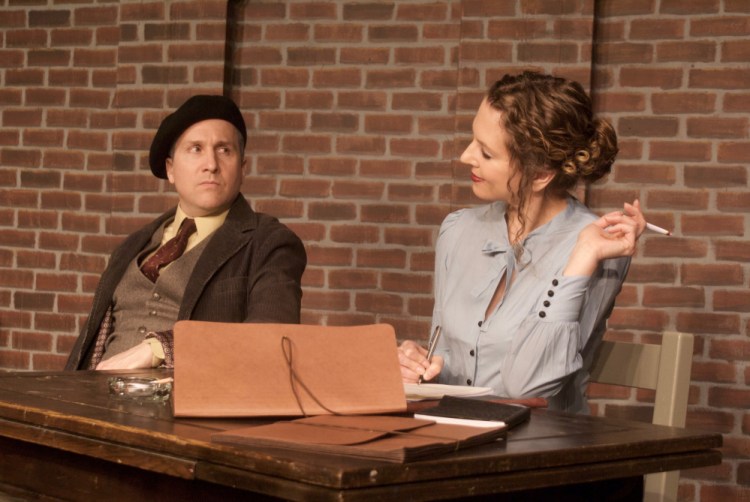The German Nazis knew the power of art. They not only publicly mocked it if they felt it didn’t meet their standards or support their cause, but they often went further and destroyed it. That’s the historical setting for Jeffrey Hatcher’s intense two-character play from 2003, “A Picasso,” now on stage at the Saco River Theatre.
As the partially fact-based drama begins, Pablo Picasso has been brought to a basement vault in Paris in 1941 to meet Miss Fischer, an emissary from the Nazi Ministry of Culture. She demands that the artist authenticate three of his self portraits, at least one of which she says will later be part of a group show. What Picasso doesn’t know at first is that the work is actually destined to be burned as “degenerate art.”
At first taken aback by the threatening situation, the crafty genius gradually turns on all his wit and charm in an attempt to find a way out for himself and his work. It’s a dangerous game of cat and mouse with his opponent also having some tricks up her sleeve.
The play unfolds with two clever characters engaging in a high-stakes debate about the interrelation of art, politics, sex and a few other things. The twists and turns that occur before the unexpected conclusion make for a highly engrossing and thought-provoking hour of theater. As a bonus, Hatcher throws in more than a few deft touches of sardonic humor along the way.
Husband and wife team Jennifer Porter and Dana Packard co-directed and co-star in the play. At Sunday’s performance, they worked together seamlessly, each providing a credible touch of German and Spanish accents to each character’s lines.
In some ways, Porter had the more difficult task. Reserved and wary of Picasso but trying to lead the arrogant artist toward the result she has been ordered to secure, she conveys persistence with just a hint of reluctance until Picasso (and the audience) learn what’s behind her facade. The emotion that eventually poured from Porter’s Miss Fischer was felt because the actress had made clear, both verbally and non-verbally, what was at risk for her character as well as the artist.
Packard’s Picasso struts and brags, dismissing lesser talents before gradually getting to the crux of the matter. The actor’s angry, booming outbursts, like Porter’s quieter eruptions, were earned by the performer. His comic moments enhanced his character’s growing confidence. When he moves in on his opponent’s physical space toward the end, it is electrifying in the context of the distance traversed in the dialogue to that point.
The production does vary a bit from the original text of the play. Perhaps ironically, some of the language has been toned down and Picasso’s sexism has been softened ever so slightly. But the essence of the play remains intact.
The stark, brick-walled storeroom set, designed by Porter, establishes the unfriendly circumstances. The period costumes, by Porter with Raisa Pelletier, add just the right touches of flamboyance and demureness for the characters as they struggle to save what and who they love.
Steve Feeney is a freelance writer who lives in Portland.
Copy the Story LinkSend questions/comments to the editors.



Success. Please wait for the page to reload. If the page does not reload within 5 seconds, please refresh the page.
Enter your email and password to access comments.
Hi, to comment on stories you must . This profile is in addition to your subscription and website login.
Already have a commenting profile? .
Invalid username/password.
Please check your email to confirm and complete your registration.
Only subscribers are eligible to post comments. Please subscribe or login first for digital access. Here’s why.
Use the form below to reset your password. When you've submitted your account email, we will send an email with a reset code.